Ally Dalsimer is a candidate for Congress in Virginia’s 11th District– the DC suburbs in Fairfax and Prince William counties. This is a deep blue district with a PVI of D+15. Biden beat Trump in a 71.6% to 28.4% landslide. But the incumbent, Gerry Connolly, is a corporate establishment New Dem who does nothing to push any kind of progressive agenda. Ally, on the other hand, is an award-winning environmental expert with over 30 years’ experience of policy implementation, program management, and partnership building, including managing the Defense Department’s Natural Resources Program. She has a Master’s in Public Policy with an Environmental Law and Economics track from Georgetown, and undergraduate degrees in English and Psychology from the University of Richmond. She is also a single mother of two who genuinely believes in doing what’s right, not what’s easy.
She announced her candidacy yesterday afternoon and I asked her to write a guest post introducing herself. If you are looking for a genuine progressive activist who is not looking to establish a career but to move the country forward, she may well be a candidate for you.
Please read what she has to say and consider contributing to her campaign by clicking on the Blue America 2020 congressional thermometer below.
You might also want to check out her website at AllyForCongress. And remember, even if you can’t spare some cash, she can always use volunteers to help get her message out to voters. So go there and sign up to volunteer, if you can.
It is always a steep uphill climb to displace a long-time, well-financed incumbent. She knows that and she’s going to work hard to make a case to the folks in in Herndon, Reston, Wolf Trap, Fair Oaks, Vienna, Fairfax City, Centreville, Mantua, Annandale, Kings Park, Burke, West Springfield, Lake Ridge, Dale City and Neabsco. If you know anyone in any of those towns, please tell them about Ally’s campaign.
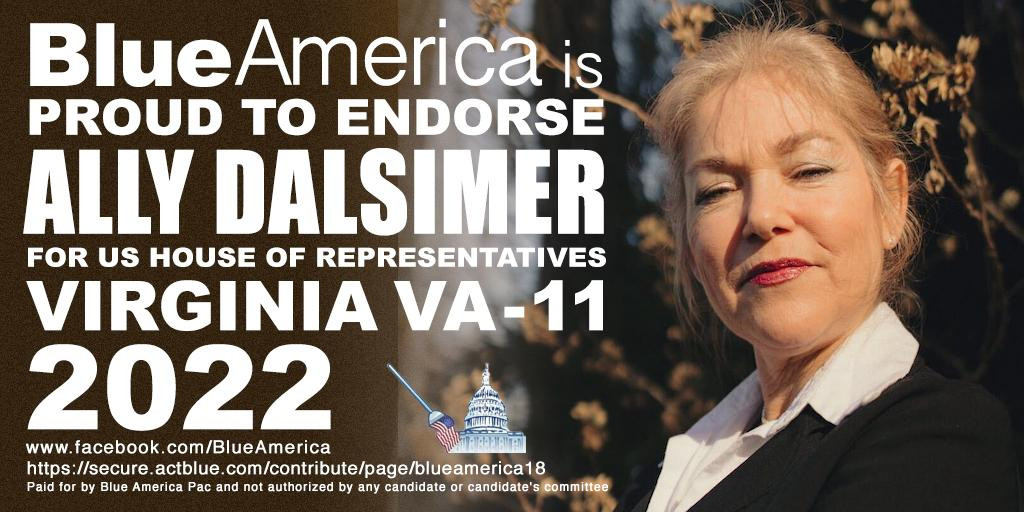
Running On Facts, Not Framing
-by Ally Dalsimer
Every student of human behavior or introductory psychology knows that ‘perception is reality.’ That is, how one perceives information and events is directly related to that person’s education, experiences, upbringing, etc. This is why words and messaging matter.
In this day of 6-second commercials and news by sound byte, people have developed remarkably short attention spans. That’s why politicians, sports teams, and advertising companies all use slogans or catchy phrases to tell or sell their messages. This is an effective and useful strategy, but it can also be misleading and damaging if the message being conveyed is muddled or inaccurate.
In the world of policy and politics, issues often are complex and inter-related. For example, COVID aside, it is estimated that 50% of all illnesses could be ‘cured’ by healthy eating, yet highly urbanized areas are virtual food deserts with little or no fresh produce (let alone organic) available. Instead, these areas have small convenience type stores that typically offer highly processed and largely unhealthy offerings. Globally, ultra-processed foods are estimated to kill ~11 million people each year (due to diabetes, heart disease, etc.). So how are we to frame that issue in a comprehensive sound byte? Let’s explore.
Longevity and quality of life are a function of healthy food options which are not available in food deserts, which are mostly located in inner city and highly urbanized areas, which disproportionately impact communities of color who, as a result of long-standing pay and other racial inequities, can’t afford to move to the suburbs, and the situation is even worse for women who often can’t get fulltime work because they can’t afford high quality pre-K, and so on. And that doesn’t even touch the fact that as many as 1 in 10 Americans have no health insurance (1 in 3 for Latinos!). All this to say that it’s hard to discuss public health issues without addressing systemic racism or the need for universal healthcare, pay equity, affordable housing, and a host of other issues. So what to do?
First and foremost, as any good speaker will tell you, it’s important to know your audience. When we are talking to a group of like-minded progressive activists, then most of the hashtags and jargon will work. But if we’re talking with folks who either don’t understand the issues or clearly misunderstand them, then we need to rethink our choice of words.
For example, a friend recently asked me– quite confidentially and uncertainly– why “all” lives don’t matter, and why I kept posting #BLM (Black Lives Matter). It was a great question, a valid one, and one that took courage for her to ask. After a brief explanation of systemic racism, I ended by saying “did you know the average life expectancy of a black trans woman is just 35 years? Only when we can make her lives matter as much as the average white person’s will all lives truly matter.” And that was that – she got it. But not everyone does. People who counter the BLM movement with ‘all lives matter’ or ‘blue lives matter’ either don’t get it or, more tragically, they do get but don’t care or don’t agree.
So, how does one address the need to undo systemic racism with racists? By finding common ground; for example, by focusing on poverty. Poverty affects all people, though disproportionately affects people of color more because it is, in part, an outcome of long-standing racist policies. Functionally though, those of us who are not part of the 1% (or the 10% for that matter) have a lot more in common with each other than we do with those who actually are part of those lofty percentages. So, for example, if we discuss income inequality and economic unfairness (rich vs. poor) in our system, we can gain support for policies and agendas designed to alleviate those inequalities (e.g., $15/hr min wage).
Similarly, we can discuss the need for universal healthcare without specifically mentioning the words “medicare for all” because the reality is that many people think enacting ‘medicare’ for everyone will bankrupt the government, result in an 80% tax rate, and result in people having to wait months and months to see a doctor. Many of these perceptions have a fact-based origin but have been distorted by corporate-sponsored interests or misperceived by people who mistakenly think socialism is the same thing as fascism or totalitarianism. Sadly, there also are those who really don’t care about the uninsured. Yet there’s a way to win these folks over too. How? Talk facts:
• Yes, there are likely to be big expenses to implement this system and longer wait times at first– anyone who has started a business knows about startup costs and that it takes time to grow supply to match demand.
• No, the long-term costs will not be higher– the Congressional Budget Office estimates long-term savings of ~$650 billion/year.
• Yes, taxes will go up BUT you won’t have monthly premiums, out-of-pocket expenses, or co-pays so you will actually pay less overall, especially if you’re a small business owner.
• No, it’s not better to go through a for-profit company for healthcare– insurance companies are middlemen who earn $.33 for every $1 you spend on healthcare. In 2020, health insurance companies made billions in net income. Why go through a middle man?
• Yes, everyone currently has ‘access’ to care by going to the ER, but we all know that an ounce of prevention is worth a pound of cure. If someone waits until they’re so sick they have to call 911 or go to the ER, the costs can be staggeringly large. And, if that person is uninsured, the hospital will pass the cost of care on to those who have insurance. And, even if you have insurance, a catastrophic illness (e.g., cancer) or accident (e.g., serious car wreck) can mean Chapter 7 ‘medical bankruptcy’ which will affect your credit for 10 years.
One phrase that is so widely mis-perceived that the words themselves recently became an issue is “defund the police.” Even through police department budgets are set at the county or municipal level, the issue gained national attention after Trayvon Martin, George Floyd, Brianna Taylor, Ahmaud Arbery, and too many other people of color were murdered. As someone who consumes a wide array of media, I can tell you that this phrase means one thing on Democracy Now! and something completely different on CNN or Fox News.
According to Fox, ‘defund the police’ does not mean fighting police brutality or race-based hate crimes; it doesn’t mean reducing bloated police budgets to fund public safety, social and youth services, mental health and education, etc. Nope. According to conservative commentary, it means that the suburbs will be overrun by criminals and no one will answer when people call 911. This is not true. We know this. But too many people don’t. Instead, they’ve taken the wording at face-value, and believe the false narratives they’re fed about impending chaos and anarchy.
Last year, I got an offer from Verizon to “upgrade” my cable package and save $40/mo for the two-year promotional period. Sounded like a win-win to me, so I signed up. That evening, I sat down to watch the nightly news. No news. Anywhere. No BBC, no PBS, no CNN, no MSNBC, no C-SPAN and also no Discovery, no History, no NatGeo (really? Nat Geo?), no channel that offered anything in any way educational. What channels did I have? Fox News, Fox Business News, OAN. Need I go on? I called the cable company, and explained I had no news stations. The woman, who sounded very young, explained that this was the most popular package, and was I sure I didn’t want to keep it? Yes, I was sure. But the other package was going to cost more and ‘won’t be as good.’ Sigh. This is what we, as progressives, are up against.
It’s why people got angry with Colin Kaepernick for respectfully kneeling to show his solidarity with and support for racial injustice. It’s probably why 64% of Americans don’t support the “defund” movement but 63% do support “black lives matter” even though ‘defunding police’ is an integral part of what the BLM movement is all about. It’s why 80 million Americans think Trump was the worst politician we’ve had in years, while another 74 million think he was ‘the greatest president ever.’
If we truly want to make meaningful changes at a systemic level, we must band together behind the causes we care about. Movement phrases help us do that. We can’t do it alone though – there simply aren’t enough progressives yet to reach critical mass. That means we also need to ‘remember our audience’ and speak to them in the language of facts and outcomes, and in ways they’ll understand and respond to.
So, while I think we can all agree that we, as progressives, must never compromise our values, I hope you also will agree that by finding common ground with others, we can grow this movement and finally– finally– be the change we want to see.

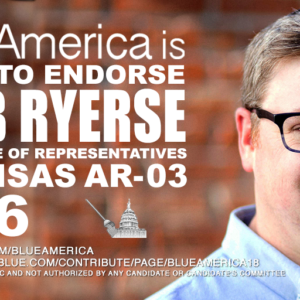
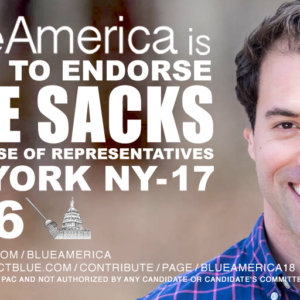

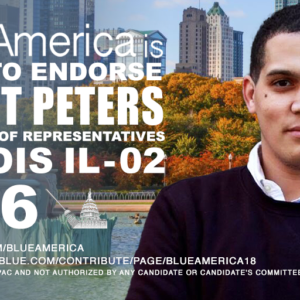
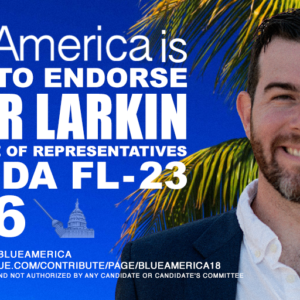



Comments